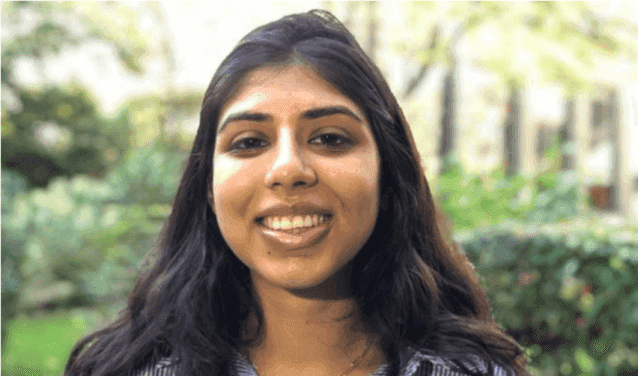Home>Master's Student Participates in Prestigious 2020 G(irls)20 Global Summit

20.11.2020
Master's Student Participates in Prestigious 2020 G(irls)20 Global Summit
Lamia Mounavaraly is a master’s student in Economics and Public Policy at the Sciences Po School of Public Affairs. This fall 2020, she flew the flag for French women at the prestigious G(irls)20 Global Summit. She tells us about her experience as an official delegate.
What is the Girls20?
Lamia Mounavaraly: Girls20 is a Canada-based organisation that works to advance the participation of young women in public and private decision-making processes. The Girls20 Summit takes place every year one month before the G20 Leaders' Summit. This year, the Summit brought together 27 delegates: from the Group of Twenty countries as well as Vietnam, Pakistan, Afghanistan, the African Union, the Middle East and North Africa region, the New Partnership for Africa's Development, and a representative of the indigenous populations from Peru. We were originally supposed to travel to Riyadh, Saudi Arabia but due to the public health crisis, our discussions took place over Zoom instead.
How did it go?
LM: We met every week for two months with the 26 other delegates. We were organised into two working groups: one on building inclusivity in decision-making spaces in the public and private sectors and the other on economic participation through digitalisation and entrepreneurship. We also discussed extensively the inclusion of young women in post-Covid economic recovery plans. We released a policy statement in light of these discussions. To help us do so, we took policy writing courses: the statement must be intelligible and resonate from South Africa to Russia. We also met with experts who guided us on what we could ask of our governments in order to have the greatest impact possible. Our statement will be presented to the G20 sherpas, but also to non-governmental organisations, representatives of civil society, and more.
What led you to get involved in the summit?
LM: I became involved in the women's rights movement when I was a high school student in La Reunion: that is when I discovered the extent of domestic violence on my island and in the country. Some friends and I started a movement in my school and we made other young people aware of the issue. At the time, I didn't yet know what to read, whom to listen to… It has since become clearer since I started studying at the Sciences Po Undergraduate College through readings and meetings with activist-classmates. Also, Hélène Périvier’s class Challenging Economy with Gender really struck me: it pushed me to look at each discipline through a gender lens. In another course, I carried out a group research project on obstetric violence, which enabled me to call into question public health policies from a gender perspective. During my third year abroad in Southeast Asia, I really dove into intersectional theories: it was crucial since coming from an overseas territory, I didn't always see myself reflected in the feminist discourse. Then, I became fully engaged in student associations including Politiqu’elles and Women in Business at Sciences Po.
I felt a need to first follow this path before applying to the Summit. Moreover, Girls20 is open to young women aged 19 to 23… 2020 was the last year I could apply! Therefore, I embarked on this adventure because the values of the organisation, the quality of their programmes and the initiatives launched by previous delegates inspired me tremendously. I was not disappointed! In a few months, I gained confidence in myself and in my ideas, I learned a lot about the situation of young women in France and in the world, and above all, I was able to connect with courageous and motivated young women who are making change in their countries.
You come from La Reunion and mentioned the lack of representativity of the French overseas departments in international decision-making bodies. Could you tell us more?
LM: Definitely: not only a lack of representativeness in international decision-making bodies, but also sometimes national ones. Whenever I talk to other young people from overseas departments, we share experiences of racism, underestimation of our abilities and great ignorance of our territories. Each French overseas department has its specificities and cultural and historical characteristics: we want to bring these forward! When I applied for the Girls20 Global Summit, the organisers had never heard of Reunion. Being able to showcase my Indian Ocean island and its wealth was a source of great pride. The people of Reunion strongly supported me in this endeavor, confirming a real need and a desire to see young people participate in decision-making processes. I am happy that I was able to do it, it means a lot to me!
What conclusions were reached during the 2020 summit?
LM: We released twelve recommendations that are detailed in our statement. These recommendations are intentionally imprecise: the aim is to be able to apply all twelve in all countries, sometimes at different scales. All these recommendations emerged from the Covid-19 crisis and have been developed in light of its impact on young women and their economic and political participation.
This article was originally published on the PRESAGE website.
More information